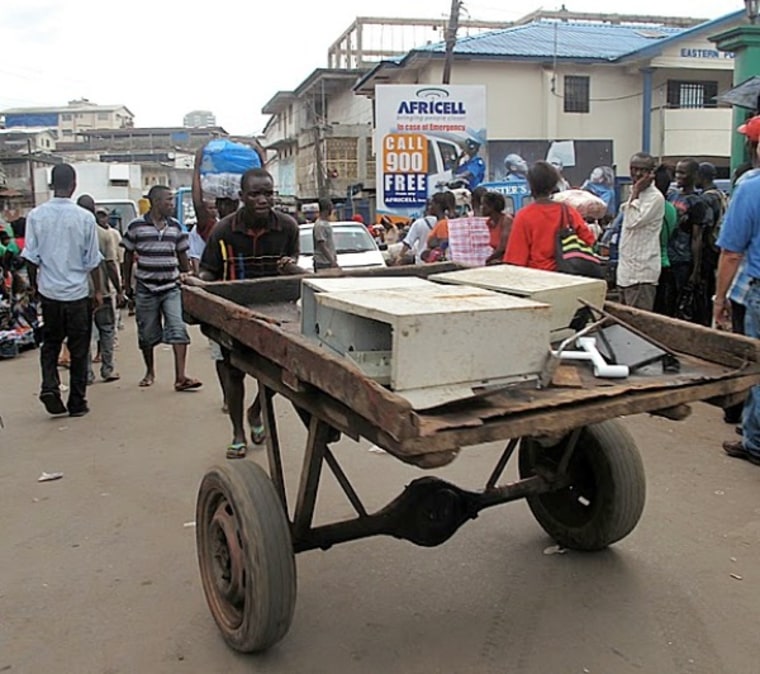I kept telling everyone, "I couldn't do this." Maybe I could have when I was 22, but that was a while ago.
We were traveling through the small African villages outside Bo, Sierra Leone's second largest city. They're tiny communities. One was about a 20-minute walk down a dirt road that grew more narrow and more overgrown with brush as we made our way. We were visiting several American Peace Corp volunteers who had just arrived here a couple of weeks ago to begin a two-year commitment as teachers in local schools. The volunteers live with host families who "adopt" them, where they live as their families do. Life becomes very, very basic.
We watched as Jessica Arriens began her day drawing water from a well for a morning bucket shower. There's a trick to lifting the water from the well without spilling most of it, a trick Arriens thinks she's finally learned. There is no running water here. No electricity either. It's very hot and dusty, temperatures hover in the 90s, and there is high humidity. Obviously, there are no fans or air conditioning. Most of the time I'm sweating profusely. Everyone else seems to be dealing with the heat a lot better than I am. Arriens is from West Chester, Ohio. She was working as a reporter at a small newspaper in New Hampshire before this. Perhaps that's why we connected.
Breakfast on this morning was fried chicken and pineapple, prepared in an outdoor kitchen over an open fire. The host family, who consider it quite an honor to take an American in, watches while Jessica eats alone. She doesn't want to do things that way. But that's the local custom, one of many things turning life upside down for the young volunteers just settling in here.
After breakfast, Arriens walks to her daily Peace Corps training session with a colleague, chatting about the work ahead and the huge spider in one of the showers. They're excited, full of enthusiasm, exchanging morning greetings in the local language they're learning with their new neighbors along the way.
Not far away, Ikena Achilihu is also settling in, getting comfortable with the single room in the house he now calls home. A bed draped with a mosquito net fills the room. A few of his favorite books line a shelf. There's a shortwave radio to hear the BBC or Voice of America. He's bouncing a big exercise ball while excitedly telling us how he just got a full length mirror and saw himself for the first time in weeks. Outside he helps with cooking fish and plantains for dinner. Night is falling. Achilihu explains how he shuts off the battery powered light in his room, jumps under the mosquito net, and opens his window that doesn't have a screen for a bit of night air. It's stifling hot. The bugs are aggressive.
Again, I'm thinking, "I couldn't do this!"
They volunteered for the Peace Corps. The organization chose where they were most needed.They're among the first group of Americans here in 16 years, a long time away because of Sierra Leone's long brutal civil war that ended in 2002. The country hasn't been safe enough for the Peace Corps to return until now.
This group of 37 volunteers is pretty typical. They're all in their 20s, from 22 different states. Only one has never traveled abroad before. Some have parents or know someone who served in the Peace Corps. They're all adventurous, all drawn to the organization for different reasons, but they all seem to see it as a rare opportunity to broaden their horizons, live in the wider world, and do whatever they can to help people much less fortunate.
Learning how to live here, without so many of the creature comforts they used to take for granted, is a big transition. However, the essence of their mission will be teaching science, math and English in local schools. The Peace Corps sends them to places most in need. Each volunteer lives and works alone. They're connected by cell phones. Someone will be an hour or two bike ride away. And they'll be working in a place where the illiteracy rate is about 70 percent, where well-trained teachers are rare, where school children often do not have books, pens or pencils, where most kids never finish grade school.
Perhaps by now you're also thinking, "I couldn't do that!"
But that's exactly what these determined souls are going to do, and no doubt they'll do it with a lot determination and huge, open hearts.
**
We hope you'll enjoy our story on the and the extended interview, video clips and pictures linked here, as much as we enjoyed the actual time spent in Sierra Leone.
From Africa to the NFL, and back again
Africa marks a day for children
'Thank you' to a Peace Corps volunteer 40 years later
NFL's Madieu Williams honors mother's memory in Sierra Leone
Slideshow: Surprising beauty amidst struggle in Sierra Leone
